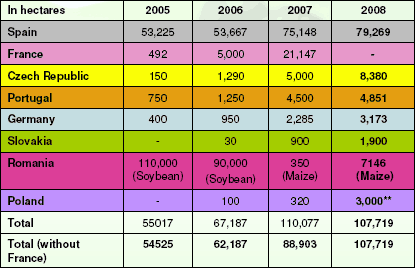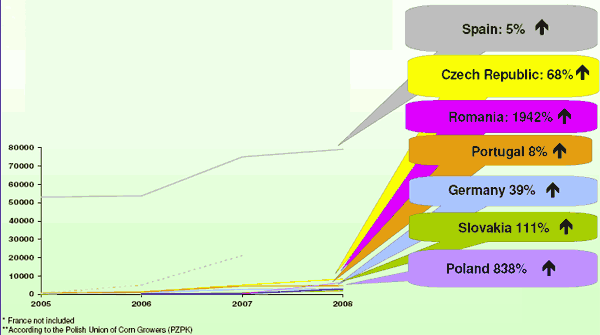Brussels, Belgium
September 29, 2008
Source:
EuropaBio
 Today,
when the EU 27 Agriculture Ministers begin their 2 day Council
meeting to discuss the farming sector but not specifically the
key issue of competitiveness, EuropaBio, the biotech industry
association, released figures on biotech crop cultivation in
Europe. These figures showed that more EU farmers are choosing
to go biotech to boost their competitiveness despite a 10 year
moratorium on new product approvals. Today,
when the EU 27 Agriculture Ministers begin their 2 day Council
meeting to discuss the farming sector but not specifically the
key issue of competitiveness, EuropaBio, the biotech industry
association, released figures on biotech crop cultivation in
Europe. These figures showed that more EU farmers are choosing
to go biotech to boost their competitiveness despite a 10 year
moratorium on new product approvals.
The total area cultivated with biotech crops in the EU in 2008
is 107 719 hectares in 7 countries, a 21% increase over 2007
(1). The cultivated acreage of biotech crops has increased over
ten fold in Poland and Romania in 2008, doubled in Slovakia and
increased substantially (68%) in the Czech Republic versus 2007.
In Spain, where most of the EU’s biotech crops are grown, the
cultivated acreage continues to increase (+5%) after 11 years of
experience with the applied technology (2).
2008 marks the 10 year anniversary since the last biotech crop
was approved for cultivation in the EU. Indeed, the only biotech
crop allowed to be grown in the EU is one type of Bt maize. It
contains a gene that allows the plant to defend itself against
the European corn borer, an insect pest which is present
primarily in southern and middle Europe.
Releasing the figures ahead of a 2 day meeting of the EU
Agriculture Ministers, EuropaBio's Executive Director of GBE,
Nathalie Moll, said “We are delighted to see that the uptake of
biotech crops continues to grow substantially every year in many
EU countries even though no new crops have been approved for
cultivation since 1998. EU farmers are clearly interested in the
products of biotechnology. We hope that the EU’s Institutions
including the Agriculture Ministers are taking note and will
start approving products again in response to their farmers’
needs and the advice of their own safety authority.”
|
 |
There are around 50 products awaiting approval in the EU, 19 of
which are for cultivation. “We strongly urge Europe’s policy
makers to end the 10 year moratorium on cultivation approvals
and give European farmers equal rights to their global
competitors to choose the products which they believe are best
to protect their crops and increase their competitiveness.” said
Jerome Peribere, the CEO and President of Dow AgroSciences who
presented the figures to the press today in Brussels on behalf
of EuropaBio.
Biotech crops are a tool for farmers to increase crop
productivity while decreasing the impact on the environment and
natural resources. Two hundred and nine (209) biotech crops are
under cultivation or development in 46 countries around the
world. Many of these crops, after being grown by non-EU farmers,
can be imported into Europe and used as food or feed.
(1) Excluding France
(2)
Chart of EU biotech crop cultivation figures 2005-2008
EuropaBio is the European Association for Bioindustries,
solely and uniquely bringing together bioscience companies from
all fields of research and development, testing, manufacturing
and distribution of biotechnology products. It has 79 corporate
members operating worldwide, 5 associate members, 6 BioRegions
and 25 national biotechnology associations representing some
1800 small and medium sized enterprises involved in research.
Its mission is to promote an innovative and dynamic
biotechnology-based industry in Europe.
Source:
Aumenta un 21% los cultivos
biotecnológicos en la UE, como reflejo del interés de los
agricultores en estos productos
Europa Bio, la Asociación Europea de Industrias de
Biotecnología, ha presentado hoy las cifras de cultivos
biotecnológicos en Europa en 2008. En total se cultivaron
107.719 hectáreas en siete países, lo que supone un aumento de
un 21% respecto a 2007. España sigue siendo líder en la
superficie de cultivos modificados genéticamente después de 11
años de experiencia con esta tecnología. En 2008 se sembraron
79.269 hectáreas frente a las 75.148 cultivadas en 2007, lo que
supone un aumento sostenido del 5%. Estas cifras muestran que
cada vez más agricultores comunitarios están eligiendo la
biotecnología para aumentar la competitividad de sus
explotaciones a pesar de los diez años de moratoria en la
aprobación de nuevos cultivos.
Los porcentajes de aumento de cultivos biotecnológicos más
representativos han tenido lugar en los países del Este de
Europa. En Rumanía, las 7146 hectáreas cultivadas con maíz Bt
suponen un aumento del 1942% respecto a las 350 hectáreas
cultivadas en 200. En Polonia se han cultivado 3000 hectáreas en
2008, un 838% más que las 320 hectáreas cultivadas en 2007. Los
cultivos biotecnológicos también se han doblado en Eslovaquia y
han aumentado un 68% en la República Checa respecto a 2007.
La presentación de estas cifras coincide con el Consejo de
Ministros de los 27 miembros de la Unión Europea, en la que se
discutirán diversos aspectos relacionados con el sector agrícola
comunitario, en el que no se tratará el tema específico de la
competitividad. En este sentido, Nathalie Moll, directora
Ejecutiva de Europa Bio, comenta que: “Estamos muy satisfechos
con la noticia de que el aumento de los cultivos biotecnológicos
en muchos países de la Unión Europea crece año tras año, incluso
teniendo en cuenta que no se han aprobado nuevas semillas
biotecnológicas desde 1998. Los agricultores comunitarios están
claramente interesados en los productos de la Biotecnología.
Esperamos que las instituciones europeas, incluyendo el Consejo
de Ministros de Agricultura, tomen nota y comiencen a aprobar
nuevos productos otra vez en respuesta a las necesidades de sus
agricultores y siguiendo los dictados de las autoridades
santarias”.
Hoy por hoy el único producto biotecnológico que se puede
cultivar en la Unión Europea es un tipo de maíz Bt. Éste
contiene un gen que permite a la planta defenderse contra el
taladro del maíz, una plaga que está presente principalmente en
el Centro y el Sur de Europa. En la actualidad hay alrededor de
50 productos esperando la autorización la Unión Europea, 19 de
ellos para cultivo. “Desde Europa Bio instamos de forma firme a
los políticos comunitarios a acabar con los diez años de
moratoria en aprobación de nuevos cultivos biotecnológicos para
dar a los agricultores europeos el derecho a competir en
igualdad de oportunidades y a elegir los productos que ellos
consideren más adecuados para proteger sus cosechas y para
aumentar su competitividad”, comenta Jerome Peribere, director
ejecutivo, de Dow AgroSciences.
Las cosechas biotecnológicias son una herramienta de futuro para
los agricultores a la hora de aumentar la productividad de sus
cosechas de forma sostenible con el medio ambiente. 209 cultivos
biotecnológicos están presentes en 46 países alrededor del
mundo. Muchos de estos productos, que no pueden ser cultivadas
por los agricultores comunitarios, sí pueden ser importados por
la UE para su uso como alimento o pienso. |
|